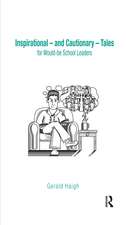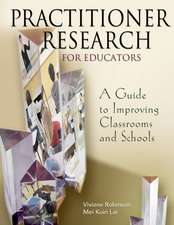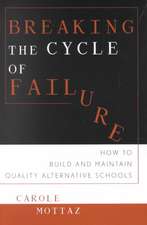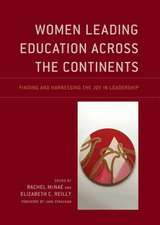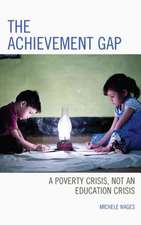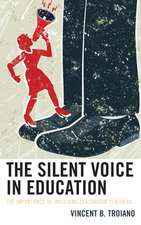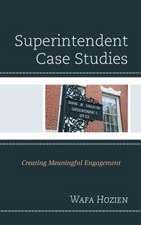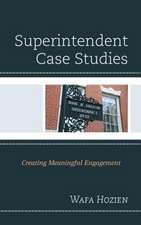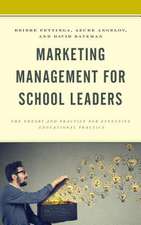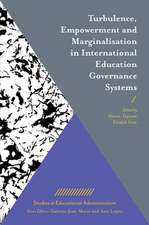Reduce Change to Increase Improvement: Corwin Impact Leadership Series
Autor Viviane M J Robinsonen Limba Engleză Paperback – 20 dec 2017
Preț: 145.92 lei
Nou
27.92€ • 29.26$ • 23.08£
Carte disponibilă
Livrare economică 21 martie-04 aprilie
Livrare express 06-12 martie pentru 18.97 lei
Specificații
ISBN-10: 1506325378
Pagini: 152
Dimensiuni: 140 x 216 x 19 mm
Greutate: 0.22 kg
Ediția:First Edition
Editura: SAGE Publications
Colecția Corwin
Seria Corwin Impact Leadership Series
Locul publicării:Thousand Oaks, United States
Recenzii
"Viviane Robinson’s brilliant new masterpiece is provocatively entitled Reduce Change to Increase Improvement. It is a stunning achievement. Every sentence bristles with penetrating insights and practical recommendations in the hands of Robinson’s sparkling prose. The sections on engaging respectfully with teachers’ theories of action should be required reading for every school principal or superintendent. Best of all, this expertly crafted book is a pleasure to read and re-read. It will be cited frequently around the world for years to come."
“Finally, a serious, evidence-proven book about educational change that takes a different tact – beginning with the impact on the learner. “Reduce Change to Increase Improvement” is a treasure-trove of concrete information for educational leaders wanting to move away from the frequently-used, ineffective Bypass Theory leading to no change in student outcomes to the rarely-used, highly effective Engagement Theory that gets at the heart of leading school improvement. Robinson, always cautious about “change for change sake”, brilliantly delineates each step of the way for leaders using authentically-documented conversations and practical discussion-starters that guide us through this collective inquiry approach towards student improvement. She highlights that only by integrating new thinking into current classroom practice will reform be successful - AND only if built on a firm foundation of leaders and teachers rigorously examining shared beliefs and exposing tacitly-held disbeliefs about the capacity of all students to learn. All leaders need this concise, clearly-stated text to guide their intentional improvement practices."
"This is a ‘must read’ for anyone who is serious about achieving meaningful improvement and understanding more about the potential of engaging with theories of action. With her forensic eye for detail, Viviane Robinson unpicks why current practice is sustained and shows how deep and respectful coaching dialogue can produce mutual commitment and powerful professional learning. It’s a book with many applications."
"Never was a book more welcome than one that addresses why so much change leads to so little impact. Viviane’s work gets right to the heart of the beliefs, values and conditions that lie at the heart of our willingness to either embrace change or resist it. Viviane gives us an opportunity to eavesdrop on real conversations that model skillful enquiry into the values and beliefs that drive our behavior and that are more likely to lead to change that ‘pays off.’ In a world where change is constant, and resources are tight we should all be intolerant of any more failed attempts. I would like to see every Education Ministry, school adviser and school leader not just reading this book but using it to shape their practice so change can be far less frequent, but have far more impact."
"I have worked with principals in graduate programs and professional learning series in six countries over the last two decades. Each and every one of these leaders would benefit from reading this new book. Viviane Robinson combines her research findings, powerful insights into how to re-design thinking about principal wellbeing, and invaluable examples from practice. The writing has voice and is highly engaging to read. The sooner this book is published, the better. These theoretically powerful and practical insights are needed and overdue."
"My colleague Dr. Judy Halbert and I have worked with principals in graduate programs and in professional learning series in six countries over the last two decades. Each and every one of these leaders would benefit from reading this new book by Professor Robinson. She combines her research findings, a logic train that is important and highly useable, a powerful insight into how to re-design thinking about principal well-being and work load and examples from practice that are invaluable. Her writing has voice and is highly engaging to read. The sooner this book has been published, the better. These theoretically powerful and practical insights are needed and overdue."
"The challenge in our current understanding of school improvement is not knowing what schools ought to do, but knowing how school leaders can get those things done. Leaders’ ability to engage and involve teachers in improvement processes is a missing resource in many schools. Reading this book will absolutely help school leaders redefine how they should act and behave in order to implement improvements to benefit not only their students’ learning but also teachers’ professional development. This book makes a significant contribution to the education management literature in a clear, concise and practical way. A ‘must read’ for new and established school leaders."
"This book is remarkable. It combines a deep understanding of how and why theories of action influence the success or failure of improvement efforts in schools, with a range of intensely practical strategies and examples that illustrate how leaders can work to enhance their approaches to change. Robinson draws on more than 10 years of research and development work with leaders, often based on detailed observation and analysis of coaching conversations and real situations in schools, to identify and make explicit the values, beliefs, actions and consequences that drive behavior and the ways in which leaders can engage with these to create shared understandings and agendas for improvement. The chapter on how this work informed the design of a new leadership development program to address well-being for school principals is particularly fascinating. I can’t recommend the book highly enough to serving leaders and all those involved in supporting change and improvement in schools."
"Reduce Change to Increase Improvement is logically developed from foundation principles to take the reader through the thinking, understanding, planning, professional learning, action, and evaluative processes. The use of general and personal theories of action is appropriate and effective. The work is supported well by illustrations and extracts from actual cases of aspects of change. I think its greatest strength is the emphasis throughout on working with and through other people and the interpersonal and cognitive work this requires. This book helps to professionalize the education profession and provides a timely and valuable resource for our understanding and building of capability for change that makes a difference to students."
Cuprins
Preface
Acknowledgments
About the Author
1. Too Much Change, Not Enough Improvement
Not All Change Is Desirable
Distinguish Between Change and Improvement
Improvement Means Positive Impact on Learners
The Impact of Leadership on Student Outcomes
Reflection and Action
2. Understand the Challenge of Improvement
Understand Theories of Action
Espoused Theories of Action Versus Theories in Use
Helping to Change Theories of Action
Reflection and Action
3. Two Approaches to Leading Improvement: Bypass and Engage
The Limitations of the Bypass Approach
The Bypass Approach: A National Initiative
From Bypass to Engagement
Reflection and Action
4. The Four Phases of Theory Engagement
Phase I. Agree on the Problem to Be Solved
Phase II. Inquire Into the Relevant Theory of Action
Phase III. Evaluate the Relative Merit of the Current and Alternative Theories of Action
Phase IV. Implement and Monitor a New, Sufficiently Shared Theory of Action
Reflection and Action
5. Learning How to Lead Improvement: Coaching That Engages Principals
Excerpt 1: Engage Others’ Thinking
Excerpt 2: The Self-Referential Critique
Excerpt 3: Bypass and Reframing
Reflection and Action
6. Learning How to Lead Improvement: Professional Learning That Engages Participants
The Context
Phase I. Agree on the Problem to Be Solved
Phase II. Reveal the Relevant Theories of Action
Phase III. Evaluate the Relative Merit of the Current and Alternative Theories of Action
Phase IV. Implement and Monitor a New, Sufficiently Shared Theory of Action
Reflection and Action
Afterword by Stephen Dinham
References
Index
Notă biografică
Viviane is a Distinguished Professor in the Faculty of Education and Social Work at the University of Auckland, New Zealand and Academic Director of its Centre for Educational Leadership. Her research identifying the impact of different types of leadership on student outcomes (Student- Centered Leadership) has been used to shape leadership policy and practice in Scandinavia, England, Singapore, Chile, Canada, Australia and New Zealand.
She has received numerous awards from national and international professional and academic organisations including the Australian Council for Educational Leaders, the New Zealand Secondary Principals Association and the US-based University Council on Educational Administration. In 2011, she was made a Fellow of the American Educational Research Association for sustained excellence in educational research. In 2016 the Royal Society of New Zealand awarded her the Mason Durie Medal for her international contributions to educational leadership research and practice. She currently leads a research and development programme on the leadership knowledge and skills involved in school improvement.
To learn more visit her website at www.education.auckland.ac.nz/vmj-robinson








